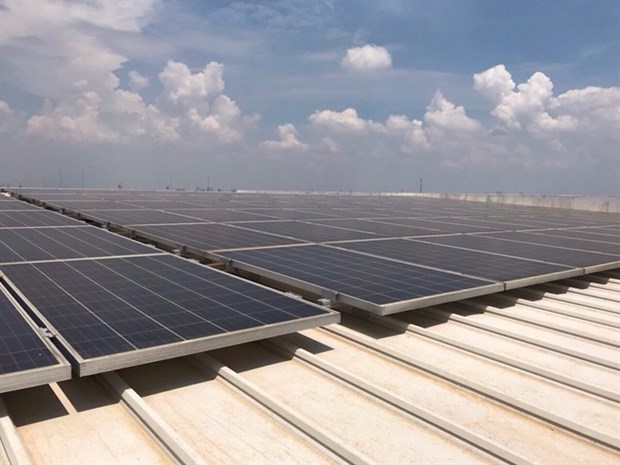Experts bullish on solar power in Vietnam
Rooftop solar power in Vietnam could be smoothly integrated into the national grid, energy experts said at a seminar in Hanoi on October 12.
 Solar power system of the German Factory DBW at the Long Hau IP in Long An province’s Can Giuoc district, the first ever green factory in Vietnam (Photo: VNA)
Solar power system of the German Factory DBW at the Long Hau IP in Long An province’s Can Giuoc district, the first ever green factory in Vietnam (Photo: VNA)Hanoi (VNA) - Rooftop solar power in Vietnam could be smoothly integrated into the national grid, energy experts said at a seminar in Hanoi on October 12.
Co-organised by the EU Energy Initiative Partnership Dialogue Facility (EUEI PDF) and the Ministry of Industry and Trade’s Electricity Regulatory Authority of Vietnam (ERAV), the seminar struck an optimistic tone on the future of solar energy in Vietnam.
Experts from an EU consultants group shared the results of a four-month pilot project on rooftop solar power in Da Nang city’s Hoa Cam industrial zone. Industrial parks are good places to build solar panels because they have large rooftops and strong electrical connections already available.
“The cost of solar power installation in Vietnam is lower than in countries such as the US,” Chad Laurent, expert of EUEI PDF’s consultants group said. “There are favourable conditions for businesses to invest in solar power.”
Speaking at the event, Alejandro Montalban, head of the Co-operation and Development Section of the EU Delegation to Vietnam, said, “We are glad that EUEI PDF has been able to provide technical assistance, and to show that there is a high potential for the integration of rooftop solar power production in Vietnam.”
Nguyen Quang Minh, deputy chairman of ERAV, said it has taken steps to shape a policy for both small rooftop solar power installations with a net-metering mechanism in households and for large rooftop installations at industrial parks.
The net-metering mechanism is a system in which solar panels or other renewable energy generators are connected to a public-utility power grid and surplus power is transferred onto the grid, allowing customers to offset the cost of power drawn from the utility.
[Solar power calculators set up to promote renewable energies]
“The development of solar power in Vietnam is a hot issue,” Minh said. “And with regards to how to develop solar power in the country, where electricity plants can only provide power well from April to September, policy-makers are finding solutions suitable to the growing desire to implement solar power.”
The Prime Minister’s Decision No 11 issued in April 2017 and the Ministry of Industry and Trade’s Circular 16, set to take effect in late October 2017, provide specific steps to guide businesses to develop solar power projects, especially rooftop solar installation, Minh said.
A representative of a Finland-funded rooftop solar power project implemented in Hanoi agreed that Government policies have assisted businesses and individuals in building up and developing solar power. But the representative said that inherent conflicts of interest between investors, household owners and the power companies are a problem.
According to the EU experts, the price of the world’s solar power has been decreasing. Since 2010, the number of solar power projects in the world has doubled.
Vietnam has extensive resources to develop solar energy with technical potential estimated at 300 Gigawatt (GW). The Vietnamese Government has set ambitious targets to install 12GW of solar power by 2030.
“And we hope the net-metering regulation will be completed as needed in the years to come, to support the market development,” said Montalban.
Thursday’s workshop was the group’s second solar-power focused seminar after the first meeting in June focused on net-metering policies for solar power.-VNA













